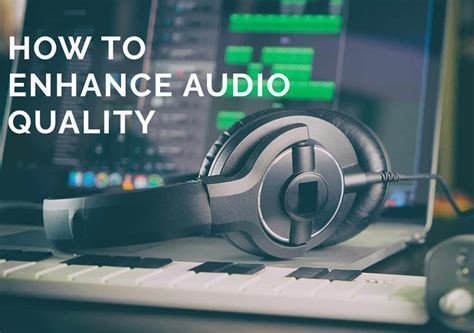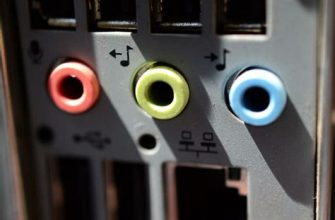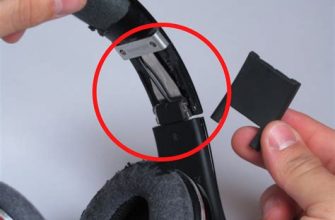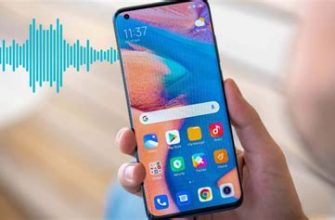Searching for that flawless, immersive sound has become a quest for many music enthusiasts. The never-ending pursuit to elevate the quality of our audio experience has led us to explore various tips and tricks to enhance the performance of our headphones.
In this article, we will delve into the realm of optimizing your headphones' sound quality. Through a careful combination of adjustments, accessories, and technical know-how, you can unlock the true potential of your headphones and immerse yourself in a world of superior sound.
Unleashing the Power of Your Headphones
One key aspect to consider in your quest for enhanced sound quality is the source material. Whether streaming your favorite songs or watching movies, the quality of the audio file will greatly impact the potential of your headphones. Ideally, opt for high-resolution audio files or lossless formats for an authentic and detailed sound experience.
Tip: Take advantage of online platforms that offer high-quality audio downloads or explore lossless streaming services for a superior audio source.
Enhancing the Audio Experience of Your Headphones

Optimizing the auditory performance of your personal sound system can greatly enhance your listening experience. By implementing a few simple techniques, you can elevate the sound quality of your headphones to new heights.
Invest in Quality: Choosing headphones that are built with superior components and advanced audio technology can make a substantial difference in the sound reproduction. Look for headphones that prioritize clarity, balance, and accuracy in their specifications.
Examine the Connection: Ensuring a strong and reliable connection between your headphones and the audio device is crucial for optimal sound quality. Use high-quality audio cables and connectors to minimize signal degradation and interference.
Adjust the EQ Settings: Experimenting with the equalizer settings of your audio device can profoundly impact the audio output of your headphones. Customizing the frequencies to match your personal preferences can bring out the best in your music.
Upgrade Audio Files: Low-quality audio files can significantly hinder the sound quality of your headphones. Consider using lossless audio formats or high-bitrate files to preserve the nuances and details of the music you love.
Find the Right Fit: Ensuring a proper fit is essential for obtaining optimal sound quality from your headphones. Pay attention to the overall comfort and adjustability of the headband and ear cup size to achieve a seal that effectively isolates external noise.
Eliminate Background Noise: Minimizing background noise is crucial for enhancing the sound quality of your headphones. Take advantage of technologies such as active noise cancellation to reduce unwanted distractions and immerse yourself fully in your audio content.
Protect Your Hearing: Listening to music at excessively high volumes can lead to long-term hearing damage. Implementing volume limits and taking regular breaks can ensure the longevity of your hearing and maintain the overall enjoyment of your audio experience.
Experiment and Adapt: Every individual has unique preferences when it comes to sound quality. Don't be afraid to experiment with different settings, audio enhancements, and listening environments to find the perfect balance that suits your taste.
By following these tips and adopting a proactive approach to audio optimization, you can elevate the sound quality of your headphones and immerse yourself in a truly captivating auditory experience.
Understanding Sound Frequency Range and Equalization
Exploring the Characteristics of Sound
When it comes to experiencing music or audio through headphones, understanding the concept of sound frequency range and equalization is essential for enhancing your listening experience. By delving into the intricacies of sound characteristics, you can unlock the full potential of your headphones and optimize the way you perceive audio.
Discovering the Spectrum of Sound Frequencies
Sound is not a one-dimensional phenomenon but rather a complex interplay of various frequencies. The frequency range of any sound encompasses a wide spectrum, from low frequencies to high frequencies, each carrying its distinctive qualities. By comprehending the concept of sound frequency range, you can better grasp the nuances of audio and achieve a more balanced and immersive sound experience.
The Importance of Equalization
Equalization, often referred to as EQ, plays a crucial role in modifying the frequency response of audio playback. It allows you to shape and adjust the balance of different frequencies, making it possible to fine-tune the audio output according to personal preferences or the genre of music being listened to. By utilizing equalization effectively, you can enhance the clarity, richness, and overall quality of the sound produced by your headphones.
Customizing Your Sound Experience
Understanding sound frequency range and equalization grants you the power to customize your sound experience to suit your preferences. Whether you desire a bass-heavy output for a thrilling music listening session or a more balanced and neutral sound for accurate audio reproduction, the ability to manipulate the frequency response allows you to tailor the audio output according to your individual tastes.
Unlocking the Full Potential of Your Headphones
By gaining a deeper understanding of sound frequency range and equalization, you can unlock the full potential of your headphones and elevate your audio experience to new heights. Experimenting with different frequency settings and understanding how they interact with different genres or types of audio can help you discover a personalized sound signature that enhances your enjoyment of music and other forms of audio content.
Selecting High-Quality Audio Files and Formats

Enhancing your auditory experience with headphones goes beyond just finding the right pair. It also involves selecting high-quality audio files and formats that can truly optimize your listening pleasure.
- Choose Lossless Formats: Opt for audio files encoded in lossless formats, such as FLAC or ALAC, which preserve all the original audio data without any loss in quality. These files ensure that you can enjoy the full fidelity of the music as the artist intended.
- Consider High-Bitrate Files: Bitrate refers to the amount of data processed per second in an audio file. Higher bitrates, typically above 256 kbps, provide more detailed and accurate sound reproduction. Look for audio files with a higher bitrate to ensure a richer listening experience.
- Look for High-Resolution Audio: High-resolution audio files contain a higher sample rate and bit depth, resulting in greater precision and clarity. For audiophiles seeking the utmost in sound quality, consider formats like WAV, AIFF, or DSD, which offer the highest possible resolution.
- Check for Original Master Recordings: Some online music stores or platforms offer original master recordings, which are direct copies of the studio-mastered tracks. These recordings capture the purest form of the music and often present superior sound quality compared to standard releases.
- Verify Source Quality: When obtaining audio files from online sources or ripping CDs, ensure that you are using reputable sources that offer high-quality recordings. Be cautious of low-quality sources that may compromise the audio fidelity.
- Consider Remastered Versions: Remastered versions of albums or tracks often involve meticulous attention to detail in enhancing the audio quality. These versions often benefit from improved mastering techniques and can provide a noticeable improvement in sound reproduction.
- Pay Attention to Dynamic Range: Dynamic range refers to the difference between the loudest and softest parts of a recording. Look for audio files with a wide dynamic range, as they allow for more nuanced and immersive listening experiences.
By carefully selecting high-quality audio files and formats, you can elevate your headphone listening experience to new heights, capturing the finer details and nuances of your favorite music.
Implementing Proper Maintenance and Care for Your Headphones
Ensuring the longevity and optimal performance of your headphones relies heavily on implementing proper maintenance and care practices. By establishing a regular routine and following some essential guidelines, you can prevent damage and maintain the sound quality of your beloved headphones.
- Keep them clean: Regularly clean your headphones to remove dirt, dust, and debris that accumulate over time. Use a soft, dry cloth or a small brush to gently wipe the surface and remove any residue. Avoid using harsh chemicals or abrasive materials to prevent damaging the headphones.
- Store them properly: When not in use, store your headphones in a clean, dry, and safe place. Avoid exposing them to extreme temperatures, moisture, or direct sunlight, as these can cause damage. Consider using a dedicated case or pouch to protect them from scratches and accidental bumps.
- Handle with care: When handling your headphones, especially when adjusting or folding them, do so with caution. Avoid yanking or pulling on the cords to prevent possible internal wire damage. Additionally, avoid excessive bending or twisting, as this may weaken the headphones' structural integrity.
- Unplug properly: When disconnecting your headphones from the audio source, gently unplug the connector instead of pulling on the cord. Pulling on the cord can lead to strain on the plug, cord, or even the headphone socket, potentially causing damage or affecting the sound quality.
- Prevent cable tangling: Minimize the risk of cable tangling by using cable management tools or methods. Consider using cable organizers, clips, or even just a simple twist tie to keep your headphone cables organized and untangled. This practice not only prevents potential cable damage but also ensures a hassle-free listening experience.
- Avoid excessive volume levels: Listening to music at excessively high volume levels can not only damage your hearing but also strain the headphone's drivers. By keeping the volume at a reasonable and comfortable level, you can protect both your ears and the headphones from unnecessary stress and potential damage.
- Regularly check for wear and tear: Perform regular visual inspections of your headphones to identify any signs of wear and tear. Look for loose connections, frayed wires, or damaged ear pads. Addressing these issues promptly can prevent further damage and ensure the continued performance of your headphones.
By following these maintenance and care practices, you can extend the lifespan of your headphones and enjoy high-quality audio for a longer period. Remember, proper maintenance and care are essential in preserving the sound quality and overall performance of your headphones.
[MOVIES] [/MOVIES] [/MOVIES_ENABLED]FAQ
How can I improve the sound quality of my headphones?
There are several ways to improve the sound quality of your headphones. First, make sure you are using high-quality audio files with a high bitrate. Additionally, you can use an equalizer to adjust the sound frequency levels according to your preferences. Another tip is to invest in high-quality headphones that are known for their excellent sound reproduction. Finally, ensure that your headphones are properly positioned on your ears for optimal sound.
Does burning in headphones really improve their sound quality?
The concept of "burning in" headphones is a controversial topic. Some people claim that it can help improve the sound quality of headphones by allowing the components to settle and adjust over time. However, there is no scientific evidence to support this. The perceived improvement in sound quality might be subjective and attributed to the listener becoming more accustomed to the headphones over time.
Is it worth using a headphone amplifier to improve sound quality?
Using a headphone amplifier can significantly improve the sound quality, especially for high-impedance headphones. Amplifiers provide more power to the headphones, resulting in better dynamics and overall clarity of sound. However, if you are using low-impedance headphones or listening at moderate volume levels, the difference in sound quality might not be as noticeable, and investing in a headphone amplifier might not be necessary.
Should I use wired or wireless headphones for better sound quality?
When it comes to sound quality, wired headphones generally provide a more reliable and high-quality audio experience compared to wireless headphones. Wired headphones have a direct signal connection and are not susceptible to interference or signal loss. However, advancements in technology have made wireless headphones more capable of providing good sound quality, especially with the introduction of high-resolution audio codecs such as aptX HD and LDAC.
Why does the sound quality of my headphones deteriorate over time?
There could be several reasons why the sound quality of your headphones deteriorates over time. One possible reason is physical wear and tear, such as damaged cables or worn-out drivers. Another reason could be the accumulation of dirt and debris on the headphone drivers, affecting their performance. Additionally, if you are regularly exposing your headphones to extreme temperatures or humidity, it can impact the sound quality. Regular maintenance, such as cleaning the headphones and storing them properly when not in use, can help prevent deterioration.




